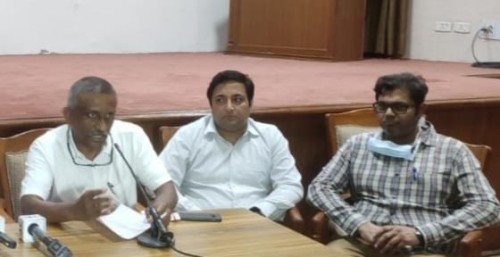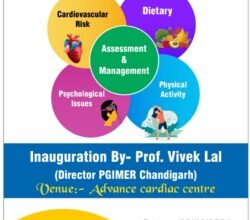Department of Surgical Gastroenterology, PGIMER has recently successfully conducted its second Simultaneous Liver Kidney Transplant

The Department of Surgical Gastroenterology, PGIMER has recently successfully conducted its second Simultaneous Liver Kidney Transplant on a 47-year-old male patient from Jammu on 29/01/23; who was suffering from simultaneous kidney and liver failure. He was able to sustain his life with support dialysis and his liver was getting supportive care. He was admitted on 28th January 2023 and operated the next day. The patient had an uneventful recovery and was discharged on 15/02/23. His total stay in the hospital was 16 days. He had no postoperative complication of any kind related to the procedure. He was discharged with normal liver and kidney functions. He has been prescribed an adequate immunosuppressant and is on follow-up. His last follow-up was 1 week back and he is ready to resume his job as a Professor of English Literature at the University of Jammu under the union territory of Jammu and Kashmir.
Previously we conducted First Simultaneous Liver and Kidney Transplant in our department on 14th June 2022, in a 24-year-old male from Himachal Pradesh. He was also suffering from simultaneous liver and kidney failure due to congenital hepatic fibrosis and end-stage renal disease. He was sustaining his life on regular renal dialysis and support for the liver. He is on regular follow-up and maintaining his kidney as well as liver function on immunosuppressant.
Both these patients are free of dialysis and have no need for any other support for the liver as of now. Before the transplant, both of these patients had a very poor quality of life and were dependent on others to perform daily activities and earn a livelihood.
We want your support in helping society by spreading the news and starting a campaign to make people aware of the program. It is also important to mention here that the total cost of a liver transplant at our institute is not even one-fourth of the total expenditure in other private centers. We are actively supported by the Dept. of hepatology, Kidney transplant, interventional radiology, biochemistry, histopathology, transfusion medicine, hospital administration, and Microbiology to help us as and when required.
Our department senior residents and staff nurses of the department work tirelessly to keep the program running successfully. As a public sector and institute of national importance, it is our responsibility to make this program available to the common man so that even the poorest of the poor could dream of a liver transplant being done.
Our team Dr. T D Yadav, Dr. Vikas Gupta, Dr. Harjeet Singh, all senior residents, and IR Staff nurses led by Mrs. Gurmeet Kaur of Dept of surgical gastroenterology PGIMER, Chandigarh
Prof. TD Yadav, Dept of surgical gastroenterology explained the Liver Transplant program & its challenges.
When is a liver transplant required?
A liver transplant is the only chance of survival/ cure for patients suffering from chronic liver disease and acute liver failure and acute chronic liver failure. Patients who are diagnosed with liver cancer in the setting of chronic liver disease may also benefit from liver transplantation in carefully selected cases.
What is overall survival after a liver transplant?
One-year survival is close to 90% in adults and it is 96-98% in the pediatric population.
Do they need lifelong treatment after a liver transplant?
Patients who are successfully transplanted need lifelong medicine to maintain graft functions. These medicines are to be taken daily and their doses are reduced with time. In the beginning, usually, three tablets have to be taken after three months usually one or two tablets with minimum doses are required as maintenance therapy.
Can a person lead a productive life after a liver transplant?
A person can lead a normal productive life after a liver transplant. He can join back his professional work. There are some restrictions that are explained by the operating team at the time of discharge.
What are the ways to get liver?
There are two different ways to get liver: Liver can be donated by brain dead and heart beating patients who are already admitted in the hospital in ICU and relatives of these types of patients take a decision to donate organs. Then these patients are assessed by the transplant team and suitability of the patient who is ready to donate is decided and if all is okay then only organ is taken for transplant. The usual criteria is: donor should be less than 65 years of age, should not have any on-going infection, there should not be cancer in the body anywhere and the organ should be suitable for transplant. This type of liver transplant is called as DDLT (Deceased Donor liver transplant)
Second type of liver transplant is called LDLT (live donor liver transplant); Here one of the close relatives can donate a portion of liver to his close relative to save his life. A normal liver has two lobes and one of the lobes can be donated to the deceased person. A minimum of 40 to 45 % of the liver is left in the donor and about 55 to 60% of the normal liver is donated to the diseased person.
Is liver donor liver transplant safe?
Liver is an unique organ and it has got immense capacity to regenerate. A 20 % of normal liver is required to sustain life therefore a healthy individual can safely donate about 55 to 60% of his liver. There is 0.5% (05 in 1000) life threatening risk of life to the donor. Other minor complications could also be there which is close to 6 to 7 % and which is manageable. Donor has to be a close relative and the blood group has to be the same.
Can organs be donated after the death of a patient?
There is a wrong perception amongst people about organ donation. Organ can’t be used after death except the cornea. For organ donation a person has to be admitted in hospital and he or she should be on a ventilator. His brain is irreversibly damaged but heart should be beating and other organs must be viable. So it must be clear in the mind that a heart berating and brain dead patients can only donate his/her organ after consent from a relative.
Who decided about brain death?
In a hospital which is recognised for organ donation there is a committee constituted by the hospital to certify brain death. It consists of a team of 5 to 6 specialist doctors who examine the patient and declare brain dead. This committee meets twice after an interval of 6 hours.
for further details please contact Dr.TD Yadav- 9464270541




